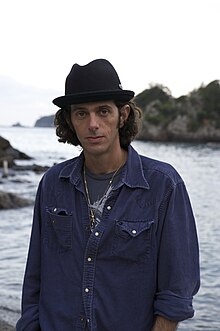
A dolphin is an aquatic mammal within the infraorder Cetacea. Dolphin species belong to the families Delphinidae, Platanistidae, Iniidae, Pontoporiidae, and possibly extinct Lipotidae. There are 40 extant species named as dolphins.

A military marine mammal is a cetacean or pinniped that has been trained for military uses. Examples include bottlenose dolphins, seals, sea lions, and beluga whales. The United States and Soviet militaries have trained and employed oceanic dolphins for various uses. Military marine mammals have been trained to rescue lost naval swimmers, guard navy ships against enemy divers, locate mines for later clearance by divers, and aid in location and recovery of equipment lost on the seabed.

A dolphinarium is an aquarium for dolphins. The dolphins are usually kept in a pool, though occasionally they may be kept in pens in the open sea, either for research or public performances. Some dolphinariums consist of one pool where dolphins perform for the public, others are part of larger parks, such as marine mammal parks, zoos or theme parks, with other animals and attractions as well.

Flipper is an American television program broadcast on NBC from September 19, 1964, until April 15, 1967. Flipper, a bottlenose dolphin, is the pet of Porter Ricks, chief warden at Coral Key Park and Marine Preserve, and his two young sons, Sandy and Bud. The show has been dubbed an "aquatic Lassie", and a considerable amount of children's merchandise inspired by the show was produced during its first run.

Flipper is a 1963 American adventure film written by Arthur Weiss based upon a story by Ricou Browning and Jack Cowden. Produced by Ivan Tors and directed by James B. Clark, the film centers on a 12-year-old boy living with his parents in the Florida Keys who befriends an injured wild dolphin. The boy and the dolphin become inseparable, eventually overcoming the misgivings of the boy's fisherman father.
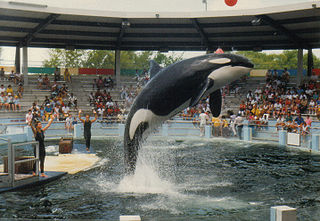
Lolita, also known as Tokitae, or Toki, and as Sk’aliCh’ehl-tenaut in the Lhaq’temish language of the Lummi nation, was a captive female orca from the southern resident orca community. She had been in captivity at the Miami Seaquarium in the United States since September 24, 1970. Lolita was the second-oldest orca in captivity after Corky at SeaWorld San Diego.

The Cove is a 2009 American documentary film directed by Louie Psihoyos that analyzes and questions dolphin hunting practices in Japan. It was awarded the Academy Award for Best Documentary Feature in 2010. The film is a call to action to halt mass dolphin kills and captures, change Japanese fishing practices, and inform and educate the public about captivity and the increasing hazard of mercury poisoning from consuming dolphin meat.

Leilani Maaja Münter is an American former professional stock car racing driver and environmental activist. She last competed in the ARCA Menards Series, and previously drove in the Firestone Indy Lights, the development league of IndyCar.
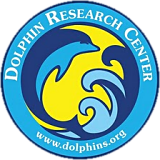
The Dolphin Research Center (DRC) is a dolphinarium on Grassy Key, Florida. The 90,000-square-foot (8,400 m2) series of saltwater lagoons is home to several dolphins and California sea lions.

Marine conservation activism is the efforts of non-governmental organizations and individuals to bring about social and political change in the area of marine conservation. Marine conservation is properly conceived as a set of management strategies for the protection and preservation of ecosystems in oceans and seas. Activists raise public awareness and support for conservation, while pushing governments and corporations to practice sound ocean management, create conservation policy, and enforce existing laws and policy through effective regulation. There are many different kinds of organizations and agencies that work toward these common goals. They all are a part of the growing movement that is ocean conservation. These organizations fight for many causes including stopping pollution, overfishing, whaling and by-catching, and supporting marine protected areas.
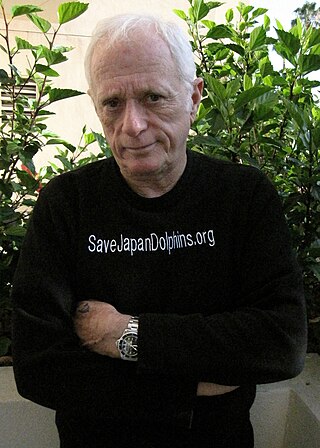
Richard "Ric" O'Barry is an American animal rights activist and former animal trainer who was first recognized in the 1960s for capturing and training the five dolphins that were used in the TV series Flipper. O'Barry transitioned from training dolphins to instead advocating against industries that keep dolphins in captivity, after one of the Flipper dolphins died. In 1996, a dolphin was seized from the Sugarloaf Dolphin Sanctuary, a corporation O'Barry worked for, for violating the Animal Welfare Act of 1966. In 1999, he was fined for violating the Marine Mammal Protection Act as the result of illegally releasing two dolphins that were not able to survive in the wild. The dolphins sustained life-threatening injuries.

Louis (Louie) Psihoyos is an American photographer and documentary film director known for his still photography and contributions to National Geographic. Psihoyos, a certified SCUBA diver, has become increasingly concerned with bringing awareness to underwater life. In 2009, he directed and appeared in the feature-length documentary The Cove, which won an Oscar for Best Documentary Feature.

The Taiji dolphin drive hunt is based on driving dolphins and other small cetaceans into a small bay where they can be killed or captured for their meat and for sale to dolphinariums. The new primary killing method is done by cutting the spinal cord of the dolphin, a method that claims to decrease the mammal's time to death. Taiji has a long connection to whaling in Japan. The 2009 documentary film The Cove drew international attention to the hunt. Taiji is the only town in Japan where drive hunting still takes place on a large scale.
Douglas Dean 'Ted' Hammond was an American veterinarian and amusement park consultant based in Asia.
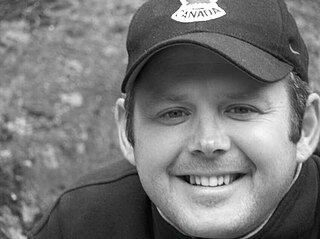
Christopher Robert Porter is a Canadian political activist and was the biggest buyer and seller of dolphins in the world.
Action for Dolphins (AFD), formerly known as 'Australia for Dolphins', is an animal welfare charity committed to achieving international protection for small cetaceans. The organisation aims to end dolphin hunting and captivity.
Margaret Howe Lovatt is an American former volunteer naturalist from Saint Thomas, U.S. Virgin Islands. In the 1960s, she took part in a NASA-funded research project in which she attempted to teach a dolphin named Peter to understand and mimic human speech. As a child, she was inspired by a book called Miss Kelly, a story about a cat who communicated with humans. This inspired her to research teaching animals to speak human language.
Dolphin are hunted in Malaita in the Solomon Islands in the South Pacific, mainly for their meat and teeth, and also sometimes for live capture for dolphinariums. Dolphin drive hunting is practised by coastal communities around the world; the animals are herded together with boats and then into a bay or onto a beach. A large-scale example is the Taiji dolphin drive hunt, made famous by the Oscar-winning documentary film The Cove. The hunt on South Malaita Island is smaller in scale. After capture, the meat is shared equally between households. Dolphin teeth are also used in jewelry and as currency on the island.
Marineland of South Australia was a public aquarium and wildlife park in West Beach, South Australia that opened in 1969 and closed permanently in 1988.
